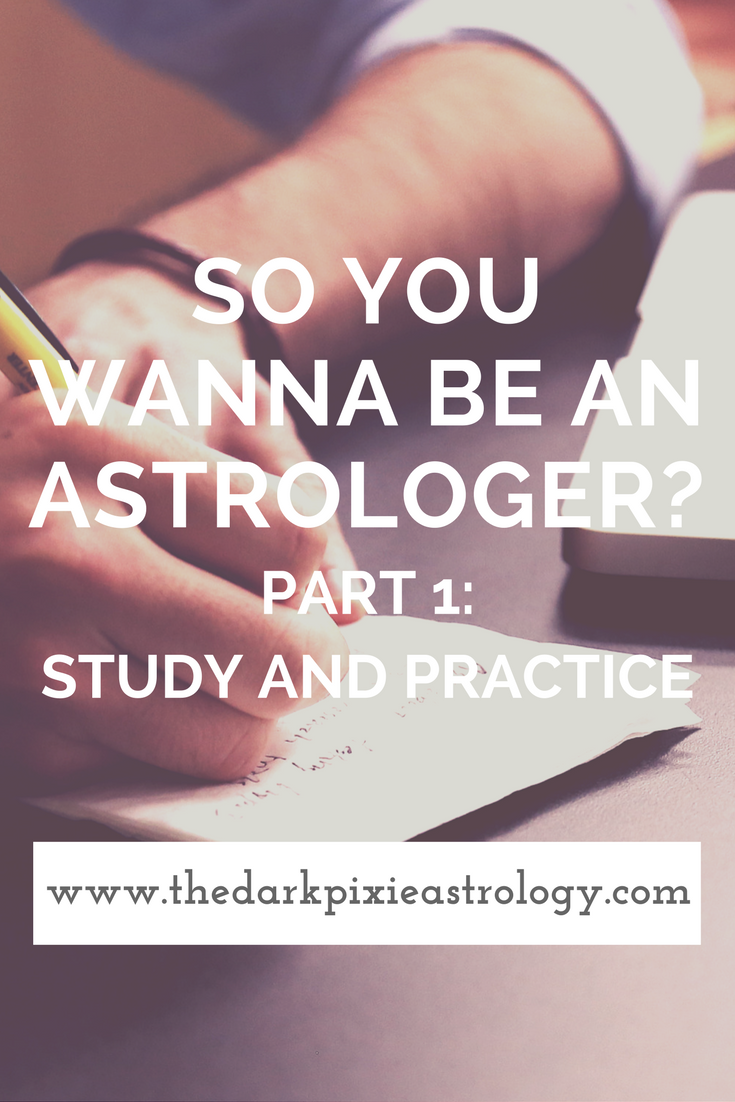|
I’ve been contacted many times over the last few years by people who want to become astrologers themselves, and want to know what’s the secret. Well, there really isn’t a secret to doing it, you just do it! You want to know the path to take, but there isn’t a straight line from point A to point B when it comes to becoming an astrologer. Since there’s no degree or certification requirements, every astrologer has a different story of how they became one. I wanted to go into what you’ll need to consider and do beforehand if you want to become an astrologer yourself, no matter how you break into the business. Study first -
The first thing you need to do is make sure you’re actually experienced enough to perform readings professionally. This means you need to have studied extensively. How many years should you study first? That depends on how much of your time you devote to it.
The more time you spend studying, the faster you’ll get there. If you can’t devote much time, it’ll take longer. Think of it like if you were going to college to get a degree. If you’re loading up on classes and not taking time off, you can get a bachelor’s degree in 2 years. If you have a job and family and other fish to fry, it can easily be 6 years. When it comes to studying, most of us learn the old-fashioned way: reading books. There are many places online where you can take advanced classes in astrology, which can be helpful when you want to make the jump past the beginner stage, but none are required. The vast majority do it on their own. Read, read, and read some more. With the internet, it’s a lot easier to get your hands on all of the knowledge out there. There are many websites where you can gather information for free, you can download any books to an e-reader from online vendors instead of scouring place after place for the book you’re looking for, and you don’t have to step inside of a bookstore if you don’t want to. And, just like how teachers have to continue to go back to school throughout their career, so too do astrologers have to continue learning. There are so many astrological methods and techniques and ideas and new ones coming about all of the time, that you have to keep learning. ou can study all of your life and never know everything there is to know about astrology. If you have an insatiable mind, this is music to the ears (or art to the eyes, since you're reading). Then practice -
The other thing required of you to perform readings professionally is to actually perform readings un-professionally first (aka for free). After all, practice makes perfect. Think of it as your internship.
Practice on yourself, friends, family, celebrity charts, anyone and everyone. Now, with the internet, you can also make use of the various forums and social media groups, and give astrology readings on there as well. How many readings should you perform? There really is no firm answer there. Some say you should give 1,000 readings before you can be a professional (and in truth, that’s about how many free readings I did before turning pro), but some of you can get by with less, and some of you will need more. When you get the feel for it, when it becomes second nature, that’s when you’re ready. If you still don't have your methodology, if it's taking you too long, if you still don't know your specialties - you're not ready yet! Depending on which branch you specialize in, degrees in other fields can be helpful. The most common degrees for an astrologer are psychology and English. Why? You’re pretty much acting like a counselor to the person you’re reading (psychology), and need to know your mythology and should have a way with words (English). Again, you don’t *need* a degree, but reading up on these subjects is a must. Optional: Certification and a Mentor
Many of you may want to get certified; again, not required, but can be worth the effort. Many professional astrologers are certified, and many are not. It’s probably 50-50. Being certified doesn’t mean you’ll be a good astrologer, but it can help show new clients that you’re not a complete idiot.
If you do go for certification, the only ones that are really worth it (in the U.S.) are through the NCGR-Professional Astrologers' Alliance (NCGR-PAA) and the American Federation of Astrologers (AFA). The main issues you may find with them is that the exams for certification are only given a few times per year (twice per year for the AFA, varies for NCGR-PAA), and they don’t have many places for you to take the exams, so you likely have to travel and maybe far, which isn’t doable for some people. The AFA has 3 exam levels, and ideally, you want to take both the Student and Professional Exams. The NGCR-PAA have 4 levels, and you’re considered a pro with the first, but should take I and II. NGCR-PAA: http://www.astrologersalliance.org/ AFA: https://www.astrologers.com/about/afa-exams/ Outside the USA, I recommend ISAR. One other thing you can consider doing to help with your studies is to find a mentor. Someone who has actual experience can be more useful than anything else, and help you in ways you wouldn’t think of. The only problem here is that most working astrologers don’t have the time to actually be mentors, and if they do, will only take on one or two at a time. You can contact astrologers you’re a fan of and see if they do any mentoring, or if they know anyone who does. But don’t blast a zillion astrologers requesting they mentor you, don’t harass someone if they say they don’t have the time, and don’t contact anyone before you’ve done studying on your own and are already at a higher level. A professional astrologer doesn’t have the time to hold your hand from the basics to the professional level, and you need to show some initiative by at least being at an intermediate level already if you want them to take you seriously. There are many astrologers that will offer courses instead, and some will work with you throughout the course. This is likely the most realistic way you'll find a mentor. The rest of the series: Part 2: Specialize Part 3: It's a Business Part 4: Ethics Comments are closed.
|
|




 RSS Feed
RSS Feed
